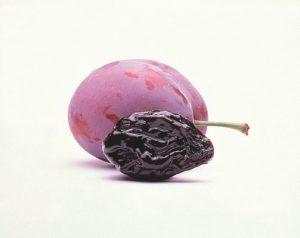Prunes are now the only natural, whole and dried fruit to achieve an authorised health claim in the EU following a six-year application process by the California Prune Board. Read on…
With eight out of ten adults in the UK not eating enough fibre, according to the National Diet and Nutrition Survey, the recent European Food Safety Authority (EFSA) ruling is welcome news for health professionals and provides final scientific proof of what generations of people have known for centuries, that prunes are good for your digestion.
Registered dietitian Jennette Higgs says, “For normal bowel function the recommendation is that we eat 25g of fibre in our diet every day, and yet 80% of the UK does not eat enough. Fibre comes from fruits, vegetables, salad, wholegrains, nuts and seeds, so it is important to include a plentiful range of these foods in your daily diet.”
Recent studies have shown that the average fibre intake of UK adults is currently 18.4g/day, which is 26% below the recommended dietary fibre intake of 25g/day. Eating 100g (8-12) of prunes every day as part of a balanced diet will provide the beneficial digestive health effect and contributes 7.1g (or a quarter) of the recommended fibre intake.
The EFSA ruling comes as a result of six years of comprehensive study to demonstrate the beneficial effect of prunes on digestive health and brings together the total weight of evidence brought from a series of studies concerning gut function, as a result of incorporating prunes in the diet.
When three is five
Three prunes provides one of the five-a-day fruit and vegetable requirements necessary for a healthy and balanced diet and prunes are also a good source of potassium, which helps maintain normal blood pressure; a source of vitamin B6 and copper, which support normal functioning of both the immune and nervous systems; and a source of vitamin K and manganese, which support the maintenance of normal bones.
Prunes are the dried version of European plums. Prunes’ soluble fibre helps normalize blood sugar levels by slowing the rate at which food leaves the stomach and by delaying the absorption of glucose (the form in which sugar is transported in the blood) following a meal. Soluble fiber also increases insulin sensitivity and can therefore play a helpful role in the prevention and treatment of type 2 diabetes. The soluble fibre in prunes promotes a sense of satisfied fullness after a meal by slowing the rate at which food leaves the stomach, so prunes can also help prevent overeating and weight gain.
The insoluble fiber provided by prunes feed friendly bacteria in the digestive tract, which helps to maintain larger populations of friendly bacteria. The ability of plum and prune to increase absorption of iron into the body has also been documented in published research.
For a cup of prunes (or 100g), there’s zero fat or salt, but 30% of your vitamin K needs, based on Recommended Daily Amounts (RDA), 20% of your RDA of potassium, 28% of your dietary fibre needs, 10% of your vitamin B needs and will be only 100 calories. However, the carb load is 64g for the same 100g, although it is of a low GI of 29 (so they are high energy but slow release, which is why they are often recommended as a carb snack for sports.
California dreaming
The process of drying plums to make prunes is thought to have originated thousands of years ago in an area near the Caspian Sea, the same region where the prune-producing European plums originated. They spread throughout Europe with the migration of different cultures and civilizations.
The process of drying plums to produce prunes took hold in California, now the leading producer of prunes worldwide, in the mid-19th century when Louis Pellier planted grafted plum tree cuttings brought back with him from his native France. Among these trees were those belonging to the Agen variety, the type of plum that is extremely well suited to be dried to make prunes.
California is the largest producer of prunes in the world due to the regions’ rigorous harvesting techniques and quality control assessments and contributes 60% of the world’s prune supplies.
Mark Dorman, International Marketing Director of the Californian Prune Board says, “This EFSA ruling has confirmed what people have known for centuries and should help people make a more informed choice about what they are eating and feeding their families. Prunes are a healthy and nutritious and we finally have an EU health ruling which confirms that prunes offer a convenient way to maintain good digestive function.”
For EFSA (2010) Scientific Opinion on Dietary Reference Values for carbohydrates and dietary fibre click here.
This news item first appeared in our free-to-receive online magazine. Go to the home page of this website to sign up – we just need your email address.





